Highlights
Australian Hair Care Company Kevin Murphy To Integrate Ocean Plastics Into Supply Chain
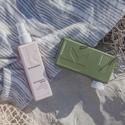
Company founder, Kevin Murphy, will use ocean plastics for his products' packaging in 2019 in an attempt to help reduce ocean plastic debris. Murphy, during a vacation in Bali, Indonesia, observed the environmental threat posed by plastic worldwide as an estimated 5 trillion tons of plastic currently litter the ocean. Danish packaging manufacturer Pack Tech is helping Murphy and his team switch to 100 percent ocean plastic packaging. To part offset the high cost of transporting, treating and reprocessing ocean plastic, Murphy increased the sale price of his products by 7 percent. Other companies that have similar advocacy include Dell and Adidas.[Image Credit: © Luis Murphy and Natasha Childs]
Johnson & Johnson And VaynerMedia Focus On Credibility To Sway Gen Z
 Brands are responding to a decline in consumer trust of influencers. Johnson & Johnson and its creative agency, VaynerMedia, are reaching out to Gen Z consumers by enlisting teenagers who, by their actions, are seen as more credible, through their actions, even if they have a more modest online following. The company selected several teenagers, including Dillon Eisman who runs a nonprofit in Southern California, to star in one of its videos promoting the skincare brand Clean & Clear, resulting in a 19 percent boost in sales. Credibility was also a key factor in turning to established major influencers Brooklyn and Bailey McKnight to launch C&C, a new Clean & Clear sub-brand. [Image Credit: © J&JCI]
Brands are responding to a decline in consumer trust of influencers. Johnson & Johnson and its creative agency, VaynerMedia, are reaching out to Gen Z consumers by enlisting teenagers who, by their actions, are seen as more credible, through their actions, even if they have a more modest online following. The company selected several teenagers, including Dillon Eisman who runs a nonprofit in Southern California, to star in one of its videos promoting the skincare brand Clean & Clear, resulting in a 19 percent boost in sales. Credibility was also a key factor in turning to established major influencers Brooklyn and Bailey McKnight to launch C&C, a new Clean & Clear sub-brand. [Image Credit: © J&JCI]
Gillette Introduces Its First Direct-To-Consumer Service In Canada
Chanel South Korea Launches Online Platform For Cosmetics
 In South Korea, Chanel launched an online platform for its cosmetic products and service with a wrapping service and select deliver day option to encourage gifting. Separately, and in an attempt to attract young customers, particularly those in their 20s and 30s, Chanel Korea launched a Coco Game Center pop-up store which features game that feature the Chanel logo.[Image Credit: © Chanel, Inc.]
In South Korea, Chanel launched an online platform for its cosmetic products and service with a wrapping service and select deliver day option to encourage gifting. Separately, and in an attempt to attract young customers, particularly those in their 20s and 30s, Chanel Korea launched a Coco Game Center pop-up store which features game that feature the Chanel logo.[Image Credit: © Chanel, Inc.]
Avon South Africa Launches Its First Beauty Pop-Up Store

In an attempt to increase accessibility [to?] and awareness of its brand, Avon South Africa opened the first of a series of exclusive beauty pop-up stores. The stores will be at major cities and will have make-up specialists and skincare experts to advise customers. Precilla Kalogeropoulos, head of integrated marketing communications at Avon, claims more pop-up stores will be launched nationwide to promote the Avon brand, and especially its premium lines, but also to encourage women to become entrepreneurs as an Avon representative. [Image Credit: © Avon Products]
L’Oréal Promotes Anca Stefan To Chief Digital Officer For Russia And Kazakhstan
Two Brands Are Using Face-To-Face Contact With Consumers To Promote Their Products
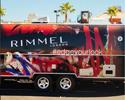 At the end of October, Nivea opened a pop-up store in London for the launch of the MicellAIR Professional cleansing line. The ‘Boo-tique’ has a Halloween theme and offers five looks by the brand’s professional make-up artists. Visitors can take away a free bag of products from the new range. In the US, Rimmel London is getting on the road during October and November with its (Street) Art of Beauty tour. Customers can visit the exclusive mobile salon, which is covered by graffiti created by the brand. The salon has makeup artists to help visitors choose Rimmel’s products. The tour goes to Los Angeles, Las Vegas, Phoenix, Dallas, Houston, Tampa and Miami.[Image Credit: © Coty Inc.]
At the end of October, Nivea opened a pop-up store in London for the launch of the MicellAIR Professional cleansing line. The ‘Boo-tique’ has a Halloween theme and offers five looks by the brand’s professional make-up artists. Visitors can take away a free bag of products from the new range. In the US, Rimmel London is getting on the road during October and November with its (Street) Art of Beauty tour. Customers can visit the exclusive mobile salon, which is covered by graffiti created by the brand. The salon has makeup artists to help visitors choose Rimmel’s products. The tour goes to Los Angeles, Las Vegas, Phoenix, Dallas, Houston, Tampa and Miami.[Image Credit: © Coty Inc.]
Harry’s Launches New Subscription Shaving Brand For Women
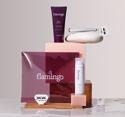
Flamingo is a new shaving subscription service launched by Harry’s, developed by its internal innovation unit, Harry’s Labs, and aimed at women. Leading the brand are Allie Melnick and Brittania Boey, who were both at Harry’s when it launched in 2013. It will compete with brands including Angel Shave Club. Flamingo razors use the same blade technology as Harry’s, but are designed with female shaving needs in mind. The shaving gel is a formulation designed to soothe the skin. Other items under the brand include a dual exfoliating and moisturizing body lotion, and waxing kits for body and face.[Image Credit: © Harry's, Inc.]
Gillette Launches Customizable 3D-Printed Razors
 Gillette has launched a new personalized platform for shaving in the US, called Dubbed Razor Maker™: powered by Gillette®. It is based on technology from Formlabs, a 3D-printing company, and offers customizable handles providing customers with flexibility over how the product looks and how much it costs. They can design their 3D-printed handle at http://razor-maker.com, selecting from 48 designs, seven colors. They can also add text. The handles can hold MACH3 or Fusion5 ProGlide blades. Delivery typically takes in 2-3 weeks, and prices start at $19. Chrome options can cost up to $45.[Image Credit: © Procter & Gamble]
Gillette has launched a new personalized platform for shaving in the US, called Dubbed Razor Maker™: powered by Gillette®. It is based on technology from Formlabs, a 3D-printing company, and offers customizable handles providing customers with flexibility over how the product looks and how much it costs. They can design their 3D-printed handle at http://razor-maker.com, selecting from 48 designs, seven colors. They can also add text. The handles can hold MACH3 or Fusion5 ProGlide blades. Delivery typically takes in 2-3 weeks, and prices start at $19. Chrome options can cost up to $45.[Image Credit: © Procter & Gamble]
Glossier Ads France To Its Geographic Reach
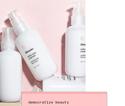
Glossier continues to expand internationally, adding France to the US, UK and Canada after first partnering with Colette, a French brand. Glossier’s founder, Emily Weiss, described the response from consumers in France as “incredible”. Weiss said the brand will soon launch in more markets globally, working only with companies that don’t conform to its cruelty-free policy.[Image Credit: © Glossier Inc. ]
J&J Acquires Japan’s Ci:z Holdings And Its Skincare And Dermocosmetic Brands
 Johnson & Johnson has announced an agreement to acquire all outstanding shares it doesn’t already own in Ci:z Holdings Co., Ltd., a Japanese skincare and dermocosmetic company, for some ¥230 billion (about US$2 billion). The deal includes brands like Genomer, Dr.Ci:Labo and Labo Labo. One of the benefits cited by J&J is improving its online commerce capabilities by “leveraging one of the largest customer relationship management databases for direct-to-consumer skincare in Japan”. The offer is expected to close early next year.[Image Credit: © Ci:z Holdings]
Johnson & Johnson has announced an agreement to acquire all outstanding shares it doesn’t already own in Ci:z Holdings Co., Ltd., a Japanese skincare and dermocosmetic company, for some ¥230 billion (about US$2 billion). The deal includes brands like Genomer, Dr.Ci:Labo and Labo Labo. One of the benefits cited by J&J is improving its online commerce capabilities by “leveraging one of the largest customer relationship management databases for direct-to-consumer skincare in Japan”. The offer is expected to close early next year.[Image Credit: © Ci:z Holdings]
Two Experts Disagree Over Large CPGs’ Prospects In DTC
 A talk by Terence Kawaja, founder of Luma Partners, an investment banking firm, and an interview with Marc Pritchard of Procter & Gamble, provided some interesting insight to the way in which new direct-to-consumer brands are taking market share from established CPGs. Kawaja sees the trend continuing, fueled as more new companies emerge funded by “rampant venture funding”. Pritchard believes that the large CPGs are countering the threat: P&G, for example, is experimenting with brands at seed-stage and has brought the direct-to-consumer startup approach to some of its brands. Kawaja is not convinced that companies like P&G can succeed with DTC brands, saying "Think about a middle-aged white man trying to dance," adding that venture funds are supporting DTC startups because of their similarity to tech companies, which P&G is trying to emulate, according to Pritchard. Kawaja called P&G’s Gillette DTC business "a copycat business model that screams inauthenticity." [Image Credit: © LUMA Partners LLC]
A talk by Terence Kawaja, founder of Luma Partners, an investment banking firm, and an interview with Marc Pritchard of Procter & Gamble, provided some interesting insight to the way in which new direct-to-consumer brands are taking market share from established CPGs. Kawaja sees the trend continuing, fueled as more new companies emerge funded by “rampant venture funding”. Pritchard believes that the large CPGs are countering the threat: P&G, for example, is experimenting with brands at seed-stage and has brought the direct-to-consumer startup approach to some of its brands. Kawaja is not convinced that companies like P&G can succeed with DTC brands, saying "Think about a middle-aged white man trying to dance," adding that venture funds are supporting DTC startups because of their similarity to tech companies, which P&G is trying to emulate, according to Pritchard. Kawaja called P&G’s Gillette DTC business "a copycat business model that screams inauthenticity." [Image Credit: © LUMA Partners LLC]
Global Companies Join The New Plastics Economy Global Commitment
 Nearly 300 organizations have has joined a global initiative to eliminate plastic waste. The New Plastics Economy Global Commitment signatories include recycling companies, packaging producers and retailers. It was announced at the Ellen MacArthur Foundation’s 'Our Ocean' conference in Bali, and was launched in collaboration with UN Environment. The initiative has three main aims: eradicate unnecessary plastic and move away from single-use packaging; work towards 100% reusable, recyclable or compostable plastic packaging by 2025; and to circulate plastic by increasing the volume of plastics that can be converted into new products or packaging. CPG companies that have signed up include Johnson & Johnson, SC Johnson, Danone, L’Oréal, Mars, PepsiCo, Unilever and Coca-Cola. Other signatories include Walmart, Target, Carrefour, Metro AG, Lidl, Ahold Delhaize, H&M, Amcor and Novamont. [Image Credit: © New Plastics Economy]
Nearly 300 organizations have has joined a global initiative to eliminate plastic waste. The New Plastics Economy Global Commitment signatories include recycling companies, packaging producers and retailers. It was announced at the Ellen MacArthur Foundation’s 'Our Ocean' conference in Bali, and was launched in collaboration with UN Environment. The initiative has three main aims: eradicate unnecessary plastic and move away from single-use packaging; work towards 100% reusable, recyclable or compostable plastic packaging by 2025; and to circulate plastic by increasing the volume of plastics that can be converted into new products or packaging. CPG companies that have signed up include Johnson & Johnson, SC Johnson, Danone, L’Oréal, Mars, PepsiCo, Unilever and Coca-Cola. Other signatories include Walmart, Target, Carrefour, Metro AG, Lidl, Ahold Delhaize, H&M, Amcor and Novamont. [Image Credit: © New Plastics Economy]
Avon Launches Personalized Beauty App in South Africa and UK
.jpg&width=125&height=53) Avon has launched its Personalized Beauty App, a tool to help Representatives offer a more personalized service. The analysis device predicts the customers skincare requirements and assesses their most appropriate shade of make-up, based on a questionnaire and skin tone measurement feature. The app is currently available in the UK and South Africa, and the company claims it has received strong positive feedback. Further development is focusing on making it available across different mobile platforms. [Image Credit: © Avon Products, Inc.]
Avon has launched its Personalized Beauty App, a tool to help Representatives offer a more personalized service. The analysis device predicts the customers skincare requirements and assesses their most appropriate shade of make-up, based on a questionnaire and skin tone measurement feature. The app is currently available in the UK and South Africa, and the company claims it has received strong positive feedback. Further development is focusing on making it available across different mobile platforms. [Image Credit: © Avon Products, Inc.]
Avon’s Russian Unit Opens Eight Pop Up Stores For Its Mark. Brand

Avon opened pop up Beauty Bars in eight Russian cities, featuring the full range of products from its “mark.” brand. Visitors can discuss the mark. products with in-store Representatives and be made up by make-up artists. Anyone wanting to buy the products can order them from the Representatives via a new online mobile shoppable brochure. The stores are also proving to useful for recruiting new Representatives.[Image Credit: © Avon Products, Inc.]
Glossier Opens A New Flagship Store Where It All Began

Beauty brand Glossier opened a flagship store on New York’s Lafayette Street, at number 123, where the brand was founded four years ago. Founder and CEO, Emily Weiss, said Glossier Flagship “is a nod” to customers that were with Glossier at the start, and ensures the brand stays in the conversation. The 3,000 square feet space is a permanent location and the "the ultimate physical expression of the brand", enabling customers to meet Glossier face-to-face. A part of the experience is a unique point-of-sale system, where online and offline sales are synced to allow customers to start an order in the store and finish it at home. It also features Glossier Offline Editors, the in-store representatives, who will “act like an educated and knowledgeable friend". [Image Credit: © Glossier Inc.]
Dollar Shave Club Is Evolving To Generate Better Momentum
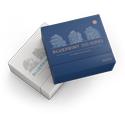 Direct-to-Consumer subscription grooming brand, Dollar Shave Club, is launching a cologne brand in collaboration with Ann Gottlieb. BluePrint will launch with six fragrances, ranked by complexity and sophistication, and DSC is also trialing sample boxes containing all six scents. The new brand is just one of the brand’s recent initiatives. It is also trialing selling products in vending machines. The brand has expanded beyond monthly deliveries of blades and now offers other shave products as well as hair, skin and oral care items. New customers are encouraged to choose the Full Service offering, which includes a starter box of products from all the categories. The moves come as the competitive environment intensifies and the company’s sales flatten. [Image Credit: © Dollar Shave Club]
Direct-to-Consumer subscription grooming brand, Dollar Shave Club, is launching a cologne brand in collaboration with Ann Gottlieb. BluePrint will launch with six fragrances, ranked by complexity and sophistication, and DSC is also trialing sample boxes containing all six scents. The new brand is just one of the brand’s recent initiatives. It is also trialing selling products in vending machines. The brand has expanded beyond monthly deliveries of blades and now offers other shave products as well as hair, skin and oral care items. New customers are encouraged to choose the Full Service offering, which includes a starter box of products from all the categories. The moves come as the competitive environment intensifies and the company’s sales flatten. [Image Credit: © Dollar Shave Club]
Shiseido Canada Is Joining The DTC Beauty Wave
 The Canadian arm of Japanese beauty company Shiseido is launching a direct-to-consumer business next year, building on the company’s DTC experience in the US over a number of years. The aim is to improve brand loyalty and get access to consumer data. The decision comes as research from IAB concludes that legacy beauty brands are missing opportunities by lagging their startup rivals in using DTC models. Beauty is also seen as a category in which consumers are relatively comfortable about buying online, and a number of large companies, including L’Oréal and Unilever, have been active in acquiring DTC beauty startups to acquire expertise and perspectives relevant for today’s beauty shopper. Many of the new digital brands are focused on social media, partly because they lack the big media budgets of some of the larger incumbents, but also because beauty is a very social category. Personalization is another aspect of beauty that startups have been able to teach larger beauty companies. [Image Credit: © SHISEIDO CO., LTD]
The Canadian arm of Japanese beauty company Shiseido is launching a direct-to-consumer business next year, building on the company’s DTC experience in the US over a number of years. The aim is to improve brand loyalty and get access to consumer data. The decision comes as research from IAB concludes that legacy beauty brands are missing opportunities by lagging their startup rivals in using DTC models. Beauty is also seen as a category in which consumers are relatively comfortable about buying online, and a number of large companies, including L’Oréal and Unilever, have been active in acquiring DTC beauty startups to acquire expertise and perspectives relevant for today’s beauty shopper. Many of the new digital brands are focused on social media, partly because they lack the big media budgets of some of the larger incumbents, but also because beauty is a very social category. Personalization is another aspect of beauty that startups have been able to teach larger beauty companies. [Image Credit: © SHISEIDO CO., LTD]
True Botanicals Open Flagship Store In San Francisco
 True Botanicals, a luxury skincare brand, has opened a flagship store in the Jackson Square area of San Francisco. Brand founder and CEO, Hillary Peterson, calls it a “self-care sanctuary”. It features an aromatherapy bar and treatment rooms to give visitors facials, as well as a lab that encourages customers to contribute to product development. The expansion follows an $8 million Series A Round funding round a few months ago, with Unilever Ventures among the investors. The brand is also focusing more on its direct-to-consumer approach, and has withdrawn from most of its third-party retailer partnerships. Peterson said the brand wants more direct relationships with its customers, to better support their choices and aims. [Image Credit: © True Botanicals]
True Botanicals, a luxury skincare brand, has opened a flagship store in the Jackson Square area of San Francisco. Brand founder and CEO, Hillary Peterson, calls it a “self-care sanctuary”. It features an aromatherapy bar and treatment rooms to give visitors facials, as well as a lab that encourages customers to contribute to product development. The expansion follows an $8 million Series A Round funding round a few months ago, with Unilever Ventures among the investors. The brand is also focusing more on its direct-to-consumer approach, and has withdrawn from most of its third-party retailer partnerships. Peterson said the brand wants more direct relationships with its customers, to better support their choices and aims. [Image Credit: © True Botanicals]
Gillette Showing Signs Of Recovery
 Gary Coombe, who heads up Procter & Gamble’s Gillette unit, said that although the company’s grooming business has encountered major challenges, things are getting better, with US sales and volume growth in the double digits in the latest quarter. Globally, organic sales were up 4 percent versus the year-ago period. Coombe also said that the brand was growing its share of the DTC market in blades and razors, following a price cut in 2017 and some initiatives in its service. It has also recently launched men’s razors for sensitive skin, an innovation for which Gillette has high hopes, and is realigning its marketing with millennials. [Image Credit: © Procter & Gamble]
Gary Coombe, who heads up Procter & Gamble’s Gillette unit, said that although the company’s grooming business has encountered major challenges, things are getting better, with US sales and volume growth in the double digits in the latest quarter. Globally, organic sales were up 4 percent versus the year-ago period. Coombe also said that the brand was growing its share of the DTC market in blades and razors, following a price cut in 2017 and some initiatives in its service. It has also recently launched men’s razors for sensitive skin, an innovation for which Gillette has high hopes, and is realigning its marketing with millennials. [Image Credit: © Procter & Gamble]
Copyright 2025 Business360, Inc.


